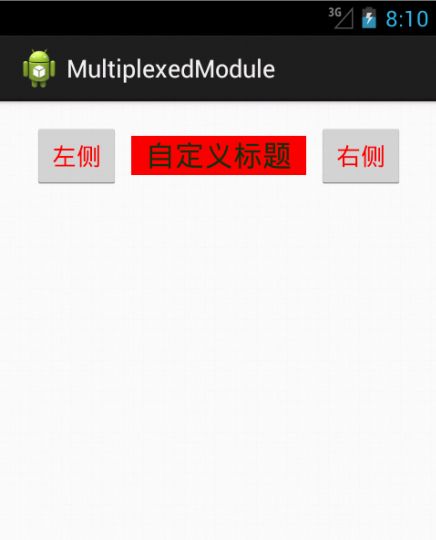Android UI开发详解之模板控件的复用
Android的UI设计一直是Android程序员比较苦恼的一件事,本文主要讲解如何将一些模板类控件进行复用,从而简化UI的开发。
如图:

我们很多程序的界面中,顶部的TopBar是不变的,所以,我们可以做一个公用的控件模板,每次使用时,只要设置相应的参数,就能生成这样一个TopBar。
模板控件实现方法:
package com.xys.multiplexedmodule;
import android.content.Context;
import android.content.res.TypedArray;
import android.graphics.Color;
import android.graphics.drawable.Drawable;
import android.text.TextUtils.TruncateAt;
import android.util.AttributeSet;
import android.view.Gravity;
import android.view.View;
import android.view.ViewGroup;
import android.widget.Button;
import android.widget.RelativeLayout;
import android.widget.TextView;
public class MultipleTopBar extends RelativeLayout{
private Button btn_left;
private Button btn_right;
private TextView tv_title;
private TopBarClickListener topBarClickListener;
private String str_title;
private RelativeLayout.LayoutParams leftButtonLayoutParams;
private RelativeLayout.LayoutParams rightButtonLayoutParams;
private RelativeLayout.LayoutParams tvTitleLayoutParams;
private static int leftBtnId=1;
private static int titleTvId=2;
private static int rightBtnId=3;
private Drawable leftBtnBackground;
private Drawable rightBtnBackground;
private String str_LeftBtn;
private String str_RightBtn;
private int leftBtnColor;
private int rightBtnColor;
private int titleTvColor;
private float titleTextSize;
public MultipleTopBar(Context context, AttributeSet attrs) {
super(context, attrs);
// TODO Auto-generated constructor stub
//从参数列表中获取参数
//TypedArray实例是个属性的容器,context.obtainStyledAttributes()方法返回得到。AttributeSet是节点的属性集合
//第二个参数为 为获取到值时的默认值
TypedArray ta=context.obtainStyledAttributes(attrs,R.styleable.TopBar);
this.str_title=ta.getString(R.styleable.TopBar_title);
this.leftBtnBackground=ta.getDrawable(R.styleable.TopBar_leftBackground);
this.rightBtnBackground=ta.getDrawable(R.styleable.TopBar_rightBackground);
this.str_LeftBtn=ta.getString(R.styleable.TopBar_leftText);
this.str_RightBtn=ta.getString(R.styleable.TopBar_rightText);
this.leftBtnColor=ta.getColor(R.styleable.TopBar_leftTextColor, 0);
this.rightBtnColor=ta.getColor(R.styleable.TopBar_rightTextColor, 0);
this.titleTextSize=ta.getDimension(R.styleable.TopBar_titleTextSize, 14);
this.titleTvColor=ta.getColor(R.styleable.TopBar_titleTextColor, 0);
ta.recycle();
btn_left=new Button(context);
btn_right=new Button(context);
tv_title=new TextView(context);
btn_left.setId(leftBtnId);
btn_right.setId(rightBtnId);
tv_title.setId(titleTvId);
//为组件配置布局参数
leftButtonLayoutParams=new RelativeLayout.LayoutParams(ViewGroup.LayoutParams.WRAP_CONTENT,ViewGroup.LayoutParams.WRAP_CONTENT);
rightButtonLayoutParams=new RelativeLayout.LayoutParams(ViewGroup.LayoutParams.WRAP_CONTENT,ViewGroup.LayoutParams.WRAP_CONTENT);
tvTitleLayoutParams=new RelativeLayout.LayoutParams(ViewGroup.LayoutParams.WRAP_CONTENT,ViewGroup.LayoutParams.WRAP_CONTENT);
leftButtonLayoutParams.addRule(RelativeLayout.ALIGN_PARENT_LEFT,RelativeLayout.TRUE);
leftButtonLayoutParams.setMargins(12, 0, 0, 0);//左上右下
leftButtonLayoutParams.addRule(RelativeLayout.CENTER_VERTICAL, RelativeLayout.TRUE);
rightButtonLayoutParams.addRule(RelativeLayout.ALIGN_PARENT_RIGHT,RelativeLayout.TRUE);
rightButtonLayoutParams.setMargins(0, 0, 12, 0);//左上右下
rightButtonLayoutParams.addRule(RelativeLayout.CENTER_VERTICAL, RelativeLayout.TRUE);
tvTitleLayoutParams.setMargins(12, 0, 12, 0);//左上右下
tvTitleLayoutParams.addRule(RelativeLayout.CENTER_VERTICAL, RelativeLayout.TRUE);
tvTitleLayoutParams.addRule(RelativeLayout.LEFT_OF, rightBtnId);
tvTitleLayoutParams.addRule(RelativeLayout.RIGHT_OF, leftBtnId);
//tvTitleLayoutParams.addRule(RelativeLayout.CENTER_IN_PARENT, RelativeLayout.TRUE);
tv_title.setGravity(Gravity.CENTER);
tv_title.setBackgroundColor(leftBtnColor);
addView(btn_left, leftButtonLayoutParams);
addView(btn_right,rightButtonLayoutParams);
addView(tv_title,tvTitleLayoutParams);
//btn_left.setBackgroundDrawable(leftBtnBackground);
btn_left.setText(str_LeftBtn);
btn_left.setTextColor(leftBtnColor);
//btn_right.setBackgroundDrawable(rightBtnBackground);
btn_right.setText(str_RightBtn);
btn_right.setTextColor(rightBtnColor);
tv_title.setTextSize(22.0f);
tv_title.setTextColor(Color.BLUE);
tv_title.setEllipsize(TruncateAt.MIDDLE);
tv_title.setGravity(Gravity.CENTER_HORIZONTAL|Gravity.CENTER_VERTICAL);
tv_title.setSingleLine(true);
tv_title.setText(str_title);
tv_title.setTextSize(titleTextSize);
tv_title.setTextColor(titleTvColor);
btn_left.setOnClickListener(new OnClickListener() {
@Override
public void onClick(View v) {
// TODO Auto-generated method stub
if(topBarClickListener!=null){
topBarClickListener.leftBtnClick();
}
}
});
btn_right.setOnClickListener(new OnClickListener() {
@Override
public void onClick(View v) {
if(topBarClickListener!=null){
topBarClickListener.rightBtnClick();
}
}
});
}
/*
* 单击监听事件
*/
public void setTopBarClickListener(TopBarClickListener topBarClickListener){
this.topBarClickListener=topBarClickListener;
}
}
监听接口:
package com.xys.multiplexedmodule;
public interface TopBarClickListener {
void leftBtnClick();
void rightBtnClick();
}
对我们自定义的模板控件,我们需要设定他的一些参数,在Values下新建attrs.xml:
<?xml version="1.0" encoding="utf-8"?>
<resources>
<!--declare-styleable:自定义属性的值 -->
<declare-styleable name="TopBar">
<attr name="title" format="string" />
<attr name="titleTextSize" format="dimension" />
<attr name="titleTextColor" format="color" />
<attr name="leftTextColor" format="color" />
<attr name="leftBackground" format="string" />
<attr name="leftText" format="string" />
<attr name="rightTextColor" format="color" />
<attr name="rightBackground" format="string" />
<attr name="rightText" format="string" />
</declare-styleable>
</resources>
现在我们就已经做好了一个模板,我们要如何使用他呢,很简单:
测试类:
package com.xys.multiplexedmodule;
import android.os.Bundle;
import android.app.Activity;
import android.view.Menu;
import android.widget.Toast;
public class TestActivity extends Activity {
private MultipleTopBar topBar;
@Override
protected void onCreate(Bundle savedInstanceState) {
super.onCreate(savedInstanceState);
setContentView(R.layout.activity_main);
topBar=(MultipleTopBar)findViewById(R.id.topBar);
topBar.setTopBarClickListener(new TopBarClickListener() {
@Override
public void rightBtnClick() {
// TODO Auto-generated method stub
Toast.makeText(TestActivity.this, "你点击的是右边的按钮", Toast.LENGTH_LONG).show();
}
@Override
public void leftBtnClick() {
// TODO Auto-generated method stub
Toast.makeText(TestActivity.this, "你点击的是左边的按钮", Toast.LENGTH_LONG).show();
}
});
}
@Override
public boolean onCreateOptionsMenu(Menu menu) {
// Inflate the menu; this adds items to the action bar if it is present.
getMenuInflater().inflate(R.menu.main, menu);
return true;
}
}
引用模板的布局文件:
<RelativeLayout xmlns:android="http://schemas.android.com/apk/res/android"
xmlns:tools="http://schemas.android.com/tools"
xmlns:custom="http://schemas.android.com/apk/res/com.xys.multiplexedmodule"
android:layout_width="match_parent"
android:layout_height="match_parent"
android:paddingBottom="@dimen/activity_vertical_margin"
android:paddingLeft="@dimen/activity_horizontal_margin"
android:paddingRight="@dimen/activity_horizontal_margin"
android:paddingTop="@dimen/activity_vertical_margin"
tools:context=".TestActivity" >
<!--一定要加入引用 xmlns:custom="http://schemas.android.com/apk/res/com.xys.multiplexedmodule" -->
<LinearLayout
android:layout_width="wrap_content"
android:layout_height="wrap_content"
android:layout_alignParentLeft="true"
android:layout_alignParentRight="true"
android:layout_alignParentTop="true"
android:orientation="vertical" >
<com.xys.multiplexedmodule.MultipleTopBar
android:id="@+id/topBar"
android:layout_width="wrap_content"
android:layout_height="wrap_content"
custom:leftBackground="@drawable/ic_launcher"
custom:leftText="左侧"
custom:leftTextColor="#ff0000"
custom:rightBackground="@drawable/ic_launcher"
custom:rightText="右侧"
custom:rightTextColor="#ff0000"
custom:title="自定义标题"
custom:titleTextColor="#123412"
custom:titleTextSize="14.0sp" >
</com.xys.multiplexedmodule.MultipleTopBar>
</LinearLayout>
</RelativeLayout>
这样我们就可以使用我们新建的模板控件了,效果如下:
